|
  Black July 1983: the Charge is Genocide
Black July 1983: the Charge is Genocide
In the
Tamil homeland in the North government security forces
went on a rampage...
In the Tamil homeland in the North and East, the security forces
of the government went on a rampage.
''Sri Lanka army personnel are on a rampage in Jaffna province,
raiding each and every house and shooting down (Tamil)
youths...Reports put the casualties of the rampage at over 300...''
(Deccan Herald, 27 July 1983)
"Leading members of the Tamil community in Jaffna have told
the Guardian that in one incident, troops killed number of
students waiting at a bus stop. They allege that the students,
aged between 18 and 20 had been lined up separately and fired
upon... Shortly afterwards troops drove through a
village...shooting at random at passers by. It was claimed that
troops were then ordered back to barracks. But soldiers in
civilian clothes were out in jeeps and raided a number of
houses, shooting inhabitants...Lawyers in Jaffna claimed that
...the town's magistrate was ordered by the Ministry of Defence
in Colombo not to hold a planned inquest...Asked yesterday, why
no inquests had been held, President Jayawardene said: 'I did'nt
know until a couple of days ago. It is too late now'."
(The Guardian, 8 August 1983)
''These accounts follow details of alleged army massacres in the
northern peninsula of Jaffna - including the murder of six school
boys at a bus stop - reported by the Guardian on Monday. They raise
questions about the responsibility of senior security force officers
and members of the Government... Last weekend, President
Jayawardene was questioned during a recorded interview about the
evidence gathered in Jaffna by the Guardian. He claimed that the
army withheld information about the massacres from him for nearly
two weeks... But the (Tamil) leader of the opposition... who was
in Mannar, has claimed that he telephoned the President the day
after the massacres took place, Monday July 25, to inform him. He
said, '''We will look into it and do what is necessary to stop it,
'' (the Tamil leader) reported.'' Rt.Rev.Dr.B.Deogupillai, Roman
Catholic Bishop of Jaffna and other prominent figures in Jaffna are
believed to have made similar representations to the Presidential
office the same day. The President says that no inquests were held
because he was informed too late.'' (The Guardian, 13 August
1983)
''Tamil civilians are reported to have been selected at
random and killed in cold blood. The victims included 8
people who were shot dead after being taken out of a bus at
Manpay and an 88 year old retired teacher and his son in law who
were killed in their house in Thirunelvely, Jaffna. News of the
killings reached AI very soon afterwards and on 26 July it sent
a telex message to Sri Lanka's President J.R.Jayawardene, urging
him to take immediate steps to prevent further such killings by
the armed forces. It also called upon the government to
establish an independent investigation into reports of killings
in Manipay, Thirunelvely, Pandetherupu, Kondavil and Chankanai
and to bring to justice those responsible.'' (Amnesty
International Newsletter, September 1983)
''Sri Lankan Army troops pulled 20 civilians off a bus (in
Jaffna) and executed them two weeks ago in retailiation for a Tamil
guerilla attack that killed 13 soldiers, a government spokesman
confirmed today.'' (The New York Times, 7 August 1983)
"The government has now admitted that, during the days
following the 23rd of July 1983, 51 members of the Tamil
minority were killed by the armed forces in the northern
region...The following eyewitness account is one example of the
type of arbitrary violations of the right to life which took
place in July:
'When the bus reached Manipay market area I noticed about
10-15 soldiers on the road. They stopped the bus in which I and
some other passengers were travelling. The soldiers asked all
those inside the bus to get down. When the passengers and
conductor got down, the soldiers asked the males to line up on
one side and the females on the other. We thought the soldiers
were going to check us and stood calmly. The soldiers then
assaulted some of the male passengers and shot at the rest. I
was so shocked at the sight that I fell down in a faint... When
I revived I got up and saw two persons laying dead with gun shot
bleeding injuries near where I had fallen. Later on I heard
there were others also who died as a result of this incident and
whose bodies were lying further away.'
This man is one of the few survivors of the army shooting
resulting in the death of 8 apparently randomly selected men at
Manipay market, a few miles north of Jaffna on 24 July 1983. He
is a witness to the death of some of the 51 Tamil civilians now
officially admitted to have been shot dead by members of the
armed forces in late July 1983 in the Jaffna district, killings
which took place on 24, 25, 26 and 27 July. Amnesty
International believes nearly all were deliberate shootings of
unarmed civilians... In a separate document Amnesty
International presents evidence concerning 42 of the 51 army
killings in July.. In all cases except one, the government is
reported to have waived inquest proceedings, a major departure
from normal procedures designed to safeguard the right to life.
The government has permitted this serious departure under the
provisions of Emergency Regulation 15A... Amnesty International
notes with concern that the killing of civilians by members of
the Sri Lanka armed forces was not condemned by the government;
Amnesty International is furthermore gravely concerned that the
government has apparently taken no effective measures to prevent
further such arbitrary killings by, for example, ordering
independent investigations into these killings, bringing to
justice those responsible and unequivocally stating that such
killings will no longer be tolerated." (Amnesty International
Report on Sri Lanka, 1 June 1984)
"During the reign of terror and murder unleashed in Jaffna by the Lankan army
on the night of July 23 and the whole of July 24, over a hundred people,
including women and children, are known to have been killed. People were killed
in thier homes, in buses, along the streets and in short, at random.
An army detatchment stationed at Mathagal in the Jaffna District had hijacked a
private mini-bus on the morning of the 24th and gone on a rampage spraying
bullets from their machine guns on people. walking along the street, travelling
in buses, in the shops and markets. The following are some of the several
incidents of atrocities committed by the army:
* At 6.30 a.m. Thillaiambalam Kandaswamy, a Security Guard of the KKS
Cement Factory, was run over and killed by an army vehicle.
* Yogarajah Sandirasegaram (34) shot and killed at Kankesanturai.
* Thurai Rajendiram (24), a trader by profession, was killed at
Pandaterruppu along with an elderly man.
* Anthonypillai Wimalathasan (29) Journalist, Thambu Kothandavani (40)
Carpenter, M. Sinnathamby (24) Accounts Clerk and another
unidentified person of about 30 years who were travelling in a minibus from
Sandilipay towards Jaffna were shot dead.
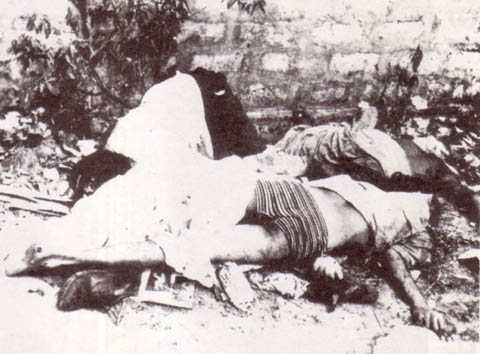
Anthonypillai Vimalathasan (29) Thampoe
Kothandavani (40)
M. Sinnathamby 24, 3 of the 4 shot by the arm at Sandilipay on 24
July 1983
* Manipay - 7.30 a.m., CTB bus (route No.782) was stopped at the Market,
passengers lined up on the public highway and male passengers shot at point
blank range with machine guns. Straying bullets also killed five school boys
instantly. A typist at the Peoples Bank and a CTB conductor were also
killed. Among those killed were A. Mailvaganam (44) Typist, Peoples Bank, A.
Seevaratnam (47) CTB Bus Conductor, Rajakanthan (19) Student, Manipay Hindu
College, Sunderavathanan (18) Student, Manipay Hindu College, V. Kumarasiri
(19) Student, Manipay Hindu College, M. Nadeswaran (1 9) Student, Manipay
Hindu College, Jayendran (16) Student, Jaffna Hindu College
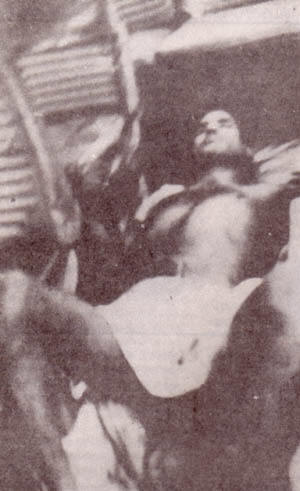 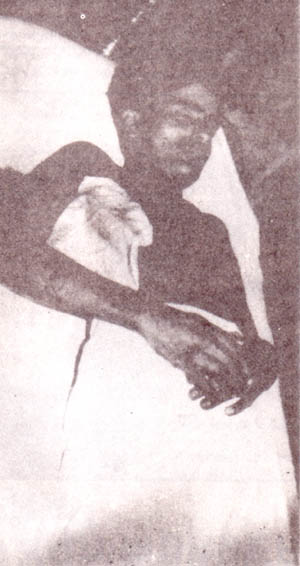
A.Seevaratnam (47) shot by the army at Manipay on 24 July
1983 (l)
and Thaventhiran (19) shot by Army at Thirunelveli on 24 July 1983 (r)
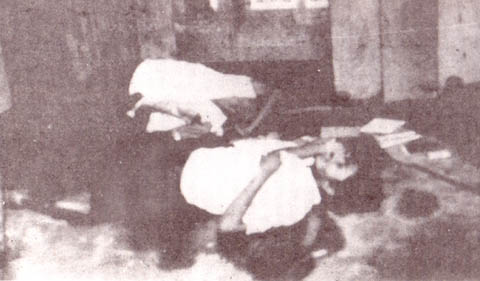
Rajakanthan and Suntharavathanan, both students
shot by Sri Lanka army on 24 July 1983 at Manipay
* Another seriously injured person had his arm amputated and is warded at
the Tellipalai Government Hospital.
* The Soldiers returned to their camp at Mathagal via Chankanai firing
bursts of machine gun fire at people on the streets all along the way.
* Between 6 a.m. and 4 p.m. these same soldiers shot dead 11 people at
Kantharmadam. Some of them were :- Sinnathamby Saravanamuttu (82) retired
teacher, Kala Parameswaran (59) Family Planning Officer,
Sivananthan (30) Manager, Rathi Watch Works, Sivam (1 3), Pararajasingham,
Land Development Officer, S. Sathiyadevan (17) Salesman, Thamby Thuraiswamy
(50) Lorry Owner/Driver,
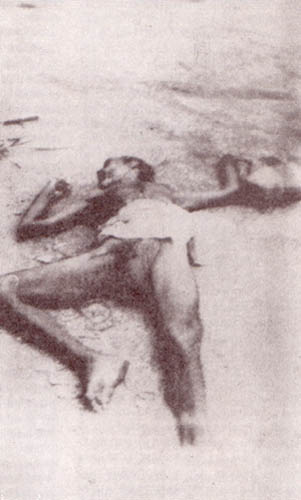
Thamby Thuraisamy (50) Lorry Driver
* The following were shot dead in their homes: Sivalingam (37) Engineer,
Krishnaanandan (32) Shopkeeper, Ramaswamy Nagarajah (23), Thavendran (19).
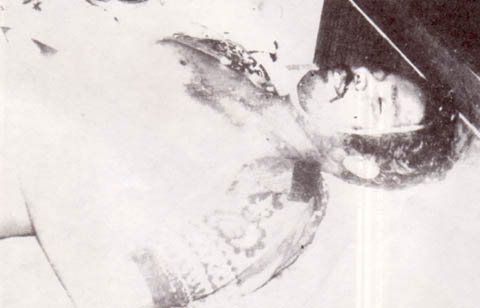
N Sivalingam (37) one of eleven killed killed
by the army at Thirunelveli on 24 July 1983
* 24th July - 2p.m. A person seriously injured the previous day
complained to the Police and this resulted in the army attacking several
houses in the complainant's village, Valithundal near Keerimalai. One person
was killed, David Amirthanandam - about 70.
* Several houses in the village were looted by the soldiers. Five persons
were abducted and severely assaulted and dumped on the wayside by the army
camp. Reign of Terror and Murder in Jaffna - Tamil
Times, August 1983
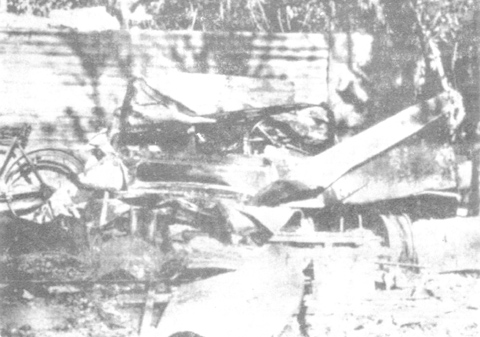
Not a scrap yard but debris of a car, a cycle and other property
set ablaze by vengeful Sri Lanka soldiers in Jaffna
- Indian Express, 2 August 1983
"I believe that recent killings by security authorities
follow a pattern previously set...The government must bear full
responsibility for these breaches of the right to life and other violations of
human rights, especially in light of the wide powers that in recent years it has
given the security forces." (Orville H.Schell, former President of the New
York City Bar Association, current Chairman of the Americas Watch Committee, and
Head of the Amnesty International 1982 fact finding mission to Sri Lanka
commented in the New York Times, 24 August 1983)
...continued.... |